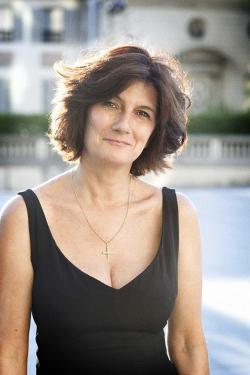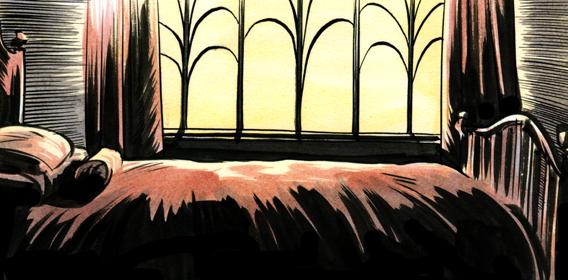There is a general formula for the “living without” memoir, whether the person is living without money, imported coffee, toilet paper, the Internet, or sex, which is the subject of Sophie Fontanel’s The Art of Sleeping Alone. The writer begins with boundless enthusiasm, puzzling giddily over the logistics of, say, bartering for gas or sending actual letters by mail. This brief phase of idealism is followed by despair as months drag on of wandering through the desert, parched. But then the deprivation leads to an important lesson, about greed, or vanity, or our frantic need to fill the void, and our narrator is forever changed. This formula works because it’s the perfect balm for our eternally Puritan souls, which thrive on occasional doses of extreme self-denial. But it leaves out one important factor: Some narrators are French.
Fontanel is not only French but also a senior editor for French Elle. An American woman enduring 12 years of sexlessness might incur occasional bouts of alienation from her own body, a sudden overwhelming urge to don a muumuu or pair of denim overalls, because why be fetching if you don’t have to? Quelle horreur, Fontanel would remark, for there is no ontological reason why the desert has to be actually dry. She makes a passing reference to baggy clothes and flat heels, but otherwise she remains throughout the ordeal altogether magnifique.
“I had no sex life,” she writes on Page 1, but then immediately follows that with: “It is true that those years were in large part filled with sensuality, when dreams alone gratified my longings, but what dreams!” In her telling, the “singularity” (she prefers that term to “abstinence” or “celibacy,” she’s said in interviews, even though it sounds a little translated from the French) she sustained between ages 27 and 39 sounds sexier than most people’s actual sex lives. She even looks sexier—so much so that a man puts down his briefcase to stare, children tell her she is beautiful, and her friends and exes press her about who she is in love with. “In a photo,” she writes, “I discovered that I’d begun to glow.”
Several American writers, including Anna Broadway and Hephzibah Anderson, have lately also given up sex, though generally for shorter periods of time. Anderson gave it up for a year after seeing an ex-boyfriend walk into a jewelry store with some blonde and propose, and Broadway as a reaction to too many friends with too many post-hookup hangovers. Both do it with the aim of emerging more empowered or less passive or otherwise in control of their sex lives. But Fontanel would never fall for such dour, instructive Americana. Even the initial scene of Fontanel’s renunciation involves a kind of ecstasy: Fontanel, one of only two guests at a ski resort, comes upon the owner, “tanned, athletic” Jonas. There are three logs on the fireplace and one Johnny Hallyday playing on the stereo. She could go to bed with Jonas, mais oui, but instead the mere thought sends her body into lockdown and her mind into a 1,000-thread-count reverie: “With the snow all around, my destiny seemed to me like an Eden sweet with birdsong. My life would be soft and fluffy. I was through with being had.”
The rest of her decade-plus sans saucisson does not unfold in the usual arc of transformation. Instead the book reads like a series of scripted soliloquies one could imagine delivered to an analyst, preferably a handsome, troubled one such as Gabriel Byrne’s character in In Treatment. Fontanel revisits her 13-year-old self, being coerced into bed by a man 20 years older, her first serious boyfriend who, she concludes, treated her like a dog. She fast-forwards to her present and contemplates her pillow (“Dare I say that I embraced it?”) and the imaginary touch of Robert Redford’s hands on her shoulder, after she sees Three Days of the Condor alone.
Over time she begins to thrill to her special status. Imagining herself to be the only sexless woman in all of France, she feels the high of playing hooky, the recklessness of a skateboarder weaving through traffic, an erotic ranking that places her above even her “doleful swinger” friends. “Not one of them could stand my singleness,” she writes, “because it could have been theirs.” She becomes, in her intransigence, “more dangerous than a virgin.” (Are virgins dangerous?) She accomplishes this sleight of hand—being both sexy and sexless—the way French women brag about eating foie gras and cheese and still fitting into their pencil skirts: with some skillful obfuscation of the sacrifices involved.
Does she get lonely sometimes? Does she masturbate? (People ask her that, she admits, but she doesn’t really answer.) Does the soft fluffiness of her life mask the total absence of hardness? We don’t know, although we do know that she became one with the bees and the poppies and that she now lived on a plane where “fairy tales become real.”
On her recent American tour, no doubt pressed by literal-minded American publicists, Fontanel has filled in a little detail. By giving her body a rest, Fontanel found a way, she wrote in a recent New York Times op-ed, to “take more pleasure while watching Robert Redford shampooing Meryl Streep’s hair in Out of Africa than being in a bed with a man. Sometimes I took pleasure just by staring at men’s necks. Sometimes, just by listening to a voice. It was libido, trust me. It was desire. But society doesn’t recognize this kind of felicity. It’s too much!” Shampoo? Neck? Excusez-nous but we have to ask again: Le cigare? Or how about le post-coital cigarette et conversation? Intimacy generally requires that the voice be actually talking to you.

Courtesy of Emmanuele Scorcelletti
One important point to draw from Fontanel’s book is that sex has become too easy, too mechanistic, entirely drained of its original sacred charge. Another more important point is that French women are better than us at everything. That’s something we have lately been schooled on abundantly through the publishing trend James Wolcott refers to in Vanity Fair as “French Women Know Best.” They already cook, eat, romance, wear lipstick, raise children, and age better than us; now they even renounce sex with more élan than we Mayflower gals can imagine. They learn their erotic lessons from Kierkegaard and Sartre. We learn ours, as Wolcott points out, from Seinfeld reruns, particularly the two episodes where George Costanza swears off sex and learns to speak Portuguese, and Elaine goes on a sex strike and turns into an idiot. Oh well, at least we have better reruns.
American books about abstinence end with important feminist lessons about dating and advocating for yourself. Fontanel’s ends, of course, with the sudden, final-chapter appearance of a mysterious beau who asks intriguing, loaded questions: What would happen if we fell in love? I suppose we should not be surprised that Fontanel’s ultimate revelation is no revelation at all. She does not emerge more empowered, enlightened, or even necessarily more in control of her own desires or body. “How quickly I put my hand where it hadn’t been in a long time, surprised to touch something that reassured me so much.” She doesn’t say what exactly she touched, but we can assume it was not soft and fluffy.
—
The Art of Sleeping Alone by Sophie Fontanel. Scribner.
See all the pieces in this month’s Slate Book Review.
Sign up for the Slate Book Review monthly newsletter.
